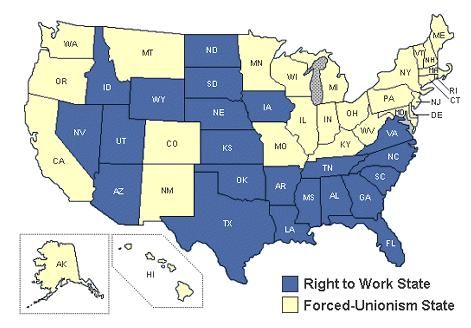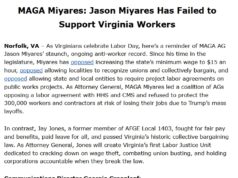 Some argue: you have no claim to the product of your labor; it’s the property of your employer. After all, the employer owns the job. And without the job, labor has no value. So follows the views of Governor McDonnell and apparently Senator Warner and DPVA Chairman Moran. Slavery redux.
Some argue: you have no claim to the product of your labor; it’s the property of your employer. After all, the employer owns the job. And without the job, labor has no value. So follows the views of Governor McDonnell and apparently Senator Warner and DPVA Chairman Moran. Slavery redux.
All of them support the oxymoronic “Right to Work” lobby; a movement rearward to the age of fiefdoms. This is a Virginia issue for any of a number of reasons. Some:
- Our Right to Work Laws foster a hostile environment for labor
- Unions protect a very small portion of the labor force
- Wages for skilled labor are lower than in states without the “Right to Work”
- Skilled labor migrates to higher wages and out of Virginia
- Democratic leadership kowtows to Republican interests above labor’s interests
A Daily Kos post this past Sunday laid out an argument that the mega-have’s are mounting a final assault on the middle-have’s. It wipes away the misconception that the “business-friendly” right-to-work states receive economic benefit in employment growth and economic gains.
But though the middle class will likely diminish as a result of this consolidation of wealth, the attack is not only against it but also against anything of value they can attach; even that of the little-haves. The Republicans have grown as ignorant about production and business as the anti-capitalists they so deride. Two sides of the same coin. They are fostering a soviet style business climate that sees wealth as a zero sum game; the only way to increase it is by taking someone else’s. Redistribution of wealth private sector style; today characterized by glossy grift.
It’s not enough for today’s Republicans that the richest 1% of the population takes in 24% of the nation’s income. Not enough for them that 20% of the population holds 85% of the wealth. Not enough for them that:
median weekly wages, when adjusted for inflation, fell slightly for both high school and college graduates from 2000 to 2009, according to a recent analysis by the Economic Policy Institute, a Washington think tank.
Determining the equitable distribution of profits should not be left to the benevolence of one factor of the production formula. Having deserted the primarily agrarian society of yore, the at least three legs on this stool (investment, innovation, and labor) must compete to divide the proceeds of production (profit). Ownership holds the cards in this formula. The most evident property in this scheme is usually capital investment and the product itself. It is a collective power. Innovation is a unique sort of labor with a special kind of leverage to balance the power of capital. As a collective, labor possesses the strength to negotiate an equitable distribution of the proceeds of production. Alone, in a large organization, a sole laborer can never stand toe to toe with management. Alone, the property of one’s labor will be usurped.
“I have always depended on the kindness of strangers.” Blanch Dubois
Follow the history of Right to Work. It is a cultural vestige nurtured in the tradition of slavery and indentured servitude. It enables the theft of productivity by removing labor’s ability to defend its property; property that passes into the tangible output of the production line and into the ownership of the company. Without the countervailing power of collective bargaining, the equitable reward for labor’s contribution is left balancing on one leg of the stool. When the Virginia Democratic leadership tips away from this traditional base of the party, the fate of the party is sealed along with the future of the soon to be former middle class. And woe to the little-haves.





![Monday News: Trump’s Lunacy Pushes China, Russia, India, etc. Together; “Happy Labor Day. Donald Trump and Elon Musk Are Screwing Workers.”; “Where is the [media’s] intense focus on Trump’s failing health?”; ““Trump says he is not a dictator. Isn’t he?”](https://bluevirginia.us/wp-content/uploads/2025/09/montage0901-238x178.jpg)








![Monday News: Trump’s Lunacy Pushes China, Russia, India, etc. Together; “Happy Labor Day. Donald Trump and Elon Musk Are Screwing Workers.”; “Where is the [media’s] intense focus on Trump’s failing health?”; ““Trump says he is not a dictator. Isn’t he?”](https://bluevirginia.us/wp-content/uploads/2025/09/montage0901-100x75.jpg)